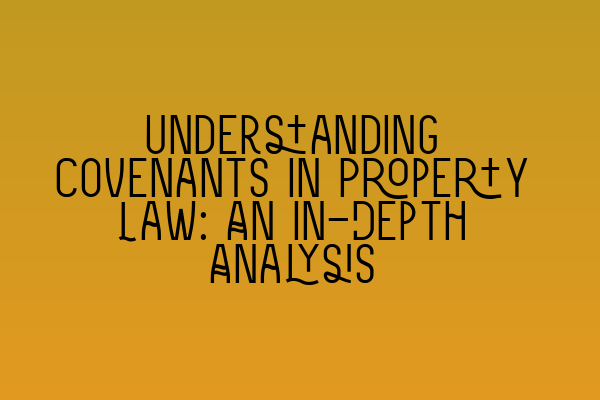Understanding Covenants in Property Law: An In-Depth Analysis
When it comes to property law, covenants play a crucial role in shaping the rights and obligations of landowners. Whether you are buying a property, selling one, or involved in a property transaction in any capacity, it is essential to have a comprehensive understanding of covenants in order to navigate the legal landscape effectively.
In this in-depth analysis, we will delve into the intricacies of covenants in property law, exploring their definition, types, enforcement, and key considerations. By the end of this article, you will have a solid grasp of this vital element of property law.
What are Covenants?
Covenants, in the context of property law, refer to legally binding agreements between landowners that impose certain obligations or restrictions on the use of the land. These agreements can be either positive or negative in nature and are typically included in the deeds or contracts governing the property.
There are two main types of covenants: positive and restrictive covenants. Positive covenants require the landowner to do something, such as maintain a fence or contribute to the maintenance of shared areas. On the other hand, restrictive covenants prohibit or restrict certain actions, such as building extensions or setting up specific types of businesses on the property.
Enforcement of Covenants
The enforcement of covenants is an important aspect of property law. In general, covenants are enforceable between the original parties who entered into the agreement. However, problems can arise when the property is sold to a new owner who may not be aware of the existence of the covenant.
In such cases, enforceability depends on whether the covenant “runs with the land.” If the covenant is said to run with the land, it means that it binds subsequent owners of the property and can be enforced against them. This is determined by a set of legal requirements, including privity of estate, intention to bind successors, and notice.
It is essential for both buyers and sellers to conduct thorough due diligence to uncover any existing covenants that may impact the property. Failing to do so could result in legal disputes and financial liabilities down the line. Seek professional legal advice to ensure all relevant covenants are identified and addressed during the transaction process.
Key Considerations
When dealing with covenants, there are several key considerations that one should keep in mind. These include:
1. Express or Implied Covenants: Covenants can either be expressly stated in the deed or contract, or they can be implied by law. Implied covenants are typically based on common law principles and are binding on the parties involved.
2. Privity of Contract and Estate: Privity of contract refers to the relationship between the original parties who entered into the covenant, while privity of estate refers to the relationship between subsequent owners of the property. Both concepts are important in determining the enforceability of covenants.
3. Modifications and Releases: It is possible for parties to modify or release covenants through formal agreements. These modifications or releases should be properly documented to ensure clarity and avoid any potential disputes in the future.
4. Breach and Remedies: If a party fails to comply with a covenant, it constitutes a breach. The injured party may seek legal remedies, which can include damages, injunctions, or specific performance. The appropriate remedy will depend on the circumstances of the case.
In Conclusion
Covenants are a fundamental aspect of property law, playing a significant role in defining the rights and obligations of landowners. Whether you are a buyer, seller, or involved in a property transaction, understanding covenants is vital to ensuring a smooth and legally compliant process.
For further information on preparing for property practice exams, check out our related article: SQE Preparation for Property Practice: Mapping Out Your Strategy.
To stay updated on the latest changes and implications of UK property laws, read our related article: Updates in UK Property Laws: Key Changes and Implications.
If you are interested in understanding the legal challenges in property transactions, consult our comprehensive guide: Legal Challenges in Property Transactions: A Comprehensive Guide.
For essential guidelines for tenants and landlords in navigating lease laws in the UK, refer to our article: Navigating Lease Laws in the UK: Essential Guidelines for Tenants and Landlords.
To avoid common pitfalls and dominate property law questions, don’t miss our article: Dominate Property Law Questions: Avoiding Common Pitfalls.
Remember, in property law, knowledge is power. Arm yourself with the right information and seek professional advice to ensure a successful property transaction.
